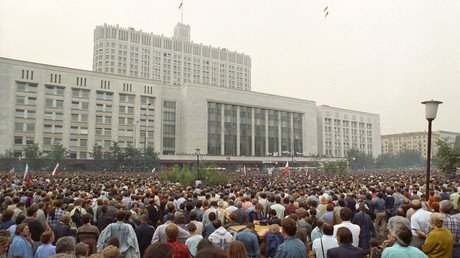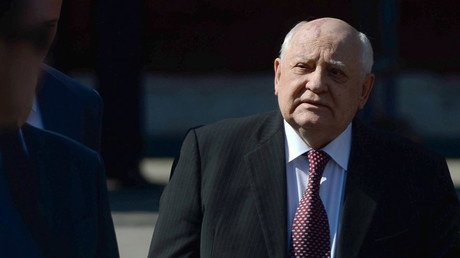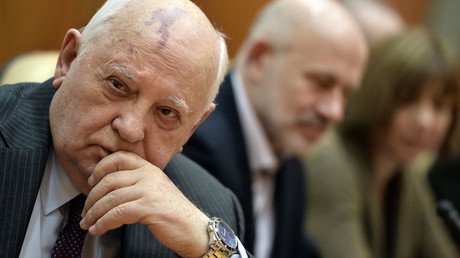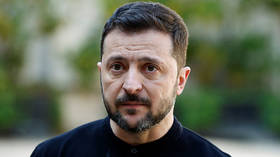West remembers 1991 Soviet coup anniversary for all the wrong reasons
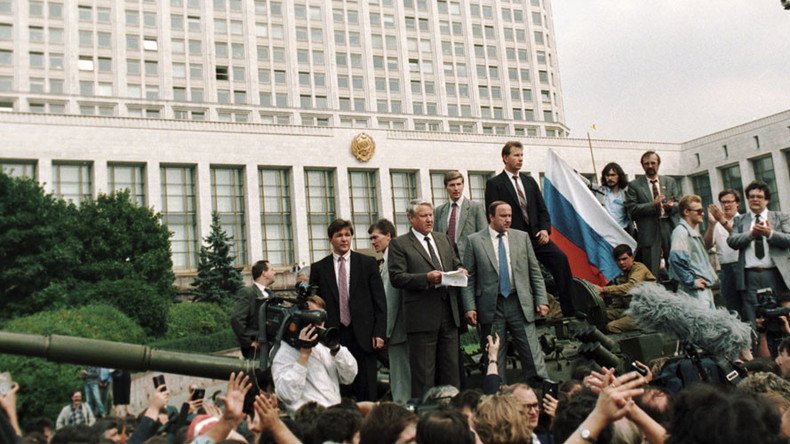
Once a year the Western media covers Russia with at least a semblance of respect and sympathy – that is August 19, the anniversary of the 1991 coup - but their reasoning for doing so is severely flawed.
August 19, 1991 marks the day when the rule of an eight-member State Emergency Committee (GKChP) went into effect for less than three days, collapsing on August 21 after a confrontation with a crowd of protesters in central Moscow.
In the last two years, a consensus has established itself among both the Russian pro-Western “liberals” and the Western “pro-liberal” writers on Russia that this event in 1991 was the Russian variant of the “revolution of dignity.” That name had been originally coined for the bloody Maidan coup in Ukraine [The Ukrainian so-called “revolution of dignity” was a three-month long street fight in 2013-2014 that led to the ouster of the legally elected president Viktor Yanukovich; 13 policemen plus dozens of violent protesters were killed and Ukraine plunged into a civil war].
The US and European mainstream media (MSM) could not find a better way for exposing its lies and double standards. NYT’s writer Masha Gessen, for example, who had no experience of living in Russia before 1991, fails to understand the trap she gets herself into when she compares the Russian events of 1991 to the “velvet revolutions” in Eastern Europe, and when she argues that life in Russia now is similar to the life in the former Soviet Union.
Revered in the West, bemoaned in Russia
The problem is that both of these MSM-glorified “revolutions of dignity” are revered in the West, but they are deeply unpopular inside the former Soviet Union itself, especially in Russia. Why? Because both of these events led to the two greatest misfortunes in the life of the USSR’s Slavic heartland since the end of the World War II in 1945: the division of families and the crumbling of production as a result of the dissolution of the Soviet Union in 1991, as well as the first major fallout between Eastern Slavic nations as a result of the violent “regime change” in Kiev in 2014.
Apolitical people in Russia and Ukraine may not remember the exact sequence of events during the coups in 1991 and 2014, but it would be nearly impossible to find a single Russian family that does not have bitter memories of the collapse of the USSR in 1991 and, likewise, would not be terrified by the war in Ukraine, which the violently installed anti-Russian regime in Kiev blames on “Russian aggression.”
A recent opinion poll, conducted in the framework of the project Sputnik-Opinion, revealed that 64 percent of Russians believed that life in the Soviet Union was better than the life they had after its collapse. The majority of the polled in 9 out of 11 former Soviet republics had the same opinion.
This reported attitude of the Russian people is no “aberration of memory.” In the vast majority of families, the collapse of the historic unified state on the territory of the former Russian empire and the Russo-Ukrainian conflict are seen as senseless tragedies. These tragedies have nothing in common with “dignity”, “democracy”, “fight against totalitarianism” and other such lofty words that writers like Masha Gessen like to employ.
“There is nothing dignified about the death of thousands of people and the impoverishment of millions,” says Boris Mezhuyev, a former deputy editor-in-chief of Izvestia daily, who in the 1990s covered the aftermath of the August 1991 coup and the subsequent collapse of the USSR. “One of the main lies of the Western press was to call the dissolution of the Soviet Union a bloodless process. The conflicts between Armenia and Azerbaijan, Georgia and Ossetia, Moldova and Transdniester, which started in 1987-1991, only escalated after the USSR fell apart. And in the Russo-Ukrainian relations the wound of Ukraine’s “amputation” was simply frozen between 1991 and 2014, with blood gushing profusely as soon as the anesthetizing ice started to melt in 2014.”
Well, talk of “dignity” mixed with “bloodless” velvet is not the only clichéd lie which the Western media has been attaching to the events of August 1991 for decades. As a person who witnessed firsthand the events of August 1991 in my capacity as a reporter for Komsomolskaya Pravda daily, I have an impression of being present at a festival of lies every year when I read Western articles devoted to the “anti-Gorbachev coup.”
The pattern of lies
The lies consist not so much in the details, as in the general pattern in which the events of those days are described. Andreas Ruesch in his article“The Stolen Victory” published in the influential Swiss daily Neue Zuricher Zeitung (NZZ) offers this “classical” pattern. Here it is in a nutshell: In August 1991, a group of evil old communists decided “to turn back the wheel of history”; they failed, because Gorbachev refused to agree to their demands on the eve of the “coup” on August 18, 1991; now, 25 years later, the same evil Chekists (members of the Soviet security services) are back in power, because “democracy never took a firm root” under Yeltsin.
Not only was I present at the scene of the events in August 1991, I interviewed several GKChP members, as well as Gorbachev himself, and I can say that every link in the NZZ-offered chain of events is a simplified version of reality, to say the least.
First, even Andreas Ruesch agrees that Gorbachev’s economic reforms (or, rather, the absence of them) “made him lose any kind of authority in the eyes of the public” before August 1991. One could also add that the unified state that had existed on the territory of the former Russian Empire for 300 years was collapsing.
In the Union Treaty, due to be signed on August 20 1991, Gorbachev managed to get signatories from only eight out of the Soviet Union’s 15 constituent republics. Ukraine, the biggest Soviet republic after Russia with a population of 50 million, promised to “review” the possibility of signing the treaty not earlier than in mid-September. Yet timing was crucial because the problem of transferring taxes from the newly “sovereign” republics to the Soviet Union’s budget in Moscow had not been resolved. Without taxes, the federal Soviet state would die (as it did a few months later, even before the official death of the USSR in December 1991). So, the action of the GKChP’s members on August 19 of 1991 was not an illegal seizure of power by a part of the Soviet leadership, but rather an attempt by a group of the most active Kremlin officials to retrieve the power the Kremlin had already lost between 1989 and 1991.
Second, the relationship between Gorbachev and the “putschists” was far more complicated than a confrontation between a reformist nicknamed Gorby (who still celebrates his birthdays in London) and a bunch of old reactionaries.
Gorbachev’s dubious role
“Gorbachev himself realized that the country was collapsing. That is the reason he himself pondered the introduction of the state of emergency in the Soviet Union. But he did not want to take the responsibility for this move personally, since it could spoil his credentials in the West,” the late Valery Boldin, the former head of Gorbachev’s Secretariat in 1991 and one of the key figures of the coup, told me in an interview in 2001, five years before his death in 2006. “That is why several GKChP members and me, we all came to see him on August 18, on the eve of the announcement of the state of emergency. Having listened to our arguments, Gorbachev said ‘To hell with you, go ahead.’ His later claims that he had no access to phone lines and that he was resisting the actions of GKChP – these claims do not hold any water.”
Boldin may not be believed 100 percent, since during the interview he had a vested interest in justifying his actions, which he had already suffered for (in 1991 he was charged with high treason and spent several months in a Moscow jail). But Gorbachev’s phrase ‘To hell with you, go ahead’ was mentioned in the memoirs of several GKChP members and is not disputed by Gorbachev himself. So, here is my question to Andreas Ruesch and his article: 'Can the August “coup” be called anti-Gorbachev, if the plotters claim to have acted on Gorbachev’s orders, corroborating their stories with documents and matching eyewitness accounts?'
There are many other truths which do not match the Western media’s “good reformers vs. evil communists” model. “We also wanted to conduct privatization and we realized the need to switch to the market mechanisms in the formation of prices,” the former Soviet prime minister Valentin Pavlov (also a GKChP member) told me in an interview in 2001. “We just did not want to do it in the way Yeltsin did in the 1990s.”
Privatization of state assets unjustly conducted under Yeltsin in the 1990s led to the formation of the powerful oligarch class, which introduced and crushed a huge chunk of Russia’s free media and whose attempts to return to power are still hurting Russia (one could cite the lawsuit for $50 billion from Russia in compensations, filed by the former oligarchic owners of the YUKOS oil major and temporarily given a green light by an arbitration court in the Hague).
The dismal performance of ‘reformers’
The truth is that Gorbachev was no Salvador Allende and Yeltsin was not that 'Russian hero speaking from a tank' – referring to the familiar image described as his high moment in the Western press. Instead, they were two leaders who both failed their country and their people. They failed to fulfill the mandate of the people, given to them at a referendum of March 17, 1991, when more than 70 percent of the Soviet Union’s citizens voted for the preservation of a unified state. Both Gorbachev and Yeltsin made concessions to the West in a vain hope of making it Russia’s ally and supporter. History has shown that both men were at best naïve by attempting to pursue such a goal.
Role of the West
Jack Matlock, who was the US ambassador to the Soviet Union in the late 1980s, the truly “velvet” years for US-Soviet relations, wrote several books and articles in an effort to prove that the United States did not try to expedite the disintegration of the Soviet Union, which went apace in 1989-1991. This may be true at least as far as the former president George Herbert Walker Bush is concerned. In July 1991, right before the Moscow coup, Bush made a conciliatory speech to the Ukrainian nationalists in Kiev, urging them to have patience in their drive for Ukrainian independence and not resort to violence. Bush proved to be right in his advice (Ukraine was given self-rule under Gorbachev, and complete independence came just a few weeks later), but the media warmongers from The Washington Post and the New York Times still cannot forgive Bush the senior for his actions.
Indeed, William Safire slammed it as the “Chicken Kiev Speech.” Obviously, President Barack Obama and Victoria Nuland, who did not ‘chicken out’ of support for the “peaceful protesters” in Kiev (that happened to kill 13 policemen with 'peaceful' Molotov cocktails), were treated by the mainstream press much more kindly than George Herbert Walker Bush and his recommended “pacifism” in 1991.
“There is no doubt that the West did not expect such a speedy disintegration of the Soviet Union and for the time being there was a pause in the Western military pressure, which Moscow had to put up with for decades under the USSR,” said Yevgeny Saburov, the minister of economy in the short-lived post-coup government of Russian Federation in 1991. There were sceptics: Bush and Clinton’s intelligence chief Robert Gates continued to think deep into 1992 that the whole democratization business in Russia was just a ploy to keep the West off guard on Moscow’s evil plans. There were also liars: Bill Clinton said in an interview in 1992 that the US would not object if the republics of the former Soviet Union decided to live together again.
When the West realized that the Soviet Union was gone for good, the pressure gradually resumed. Already in 1993, NATO took the decision to expand to Poland and several other East European states, burying Gorbachev’s illusions about “Europe without the dividing lines.” The bombing of Yugoslavia followed in 1999, George W. Bush’s Iraqi adventure started in 2003. The Ukrainian tragedy was not long in the waiting neither, degenerating into war in 2014.
“Did the United States rightly handle all the opportunities which the collapse of the communist system in Russia had to offer?” Serge Schmemann, the editor of International Herald Tribune, asked during a talk at a reception in the US embassy in Moscow. “I am not sure we used these opportunities. Our main failure was that we could not IMAGINE a different Russia. Not an enemy, not a failed state, not a danger.”
One could not put it better. The majority of politicians in the US still cannot imagine a different Russia. Instead, they wax nostalgic about the illusory events of 1991.
The statements, views and opinions expressed in this column are solely those of the author and do not necessarily represent those of RT.

